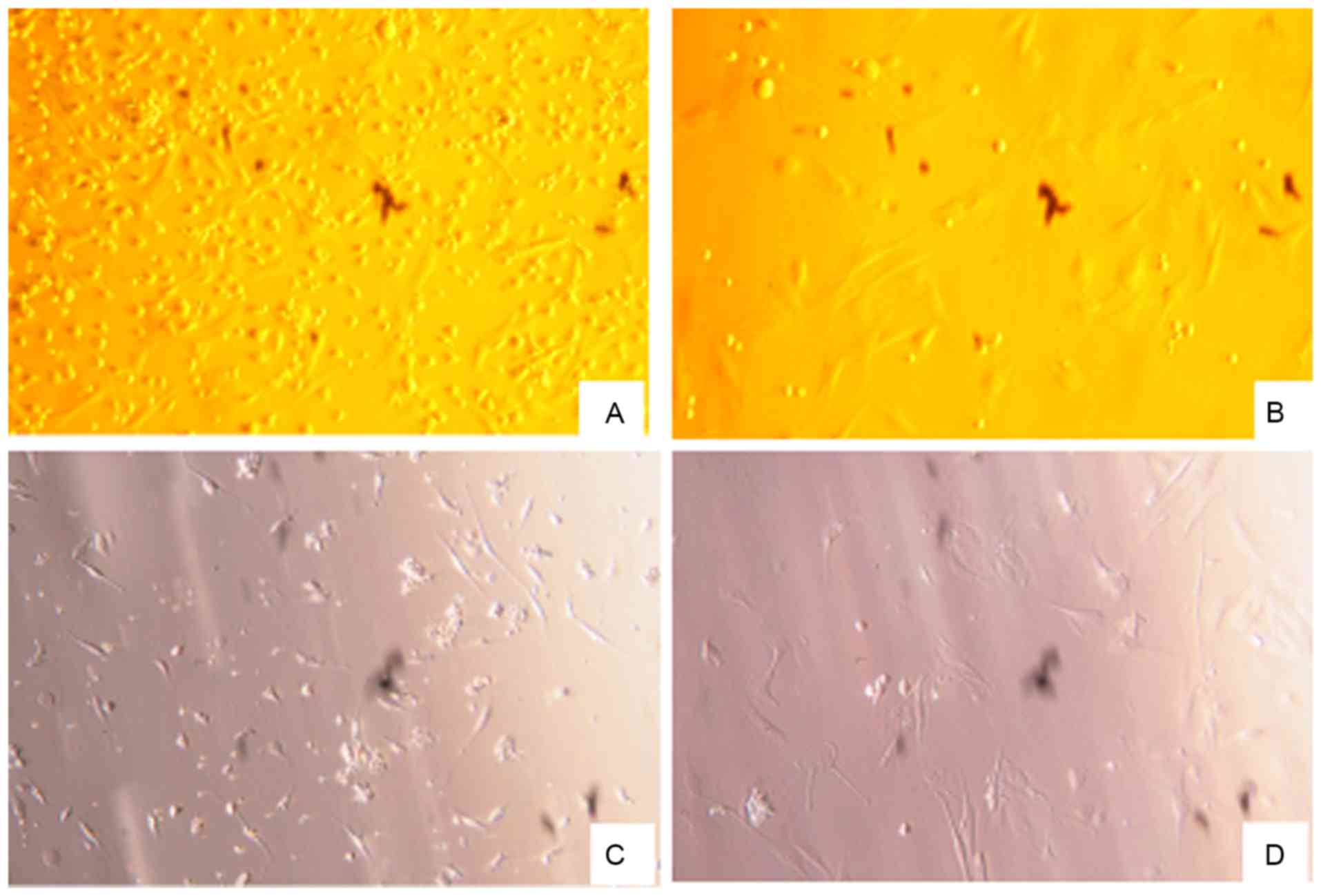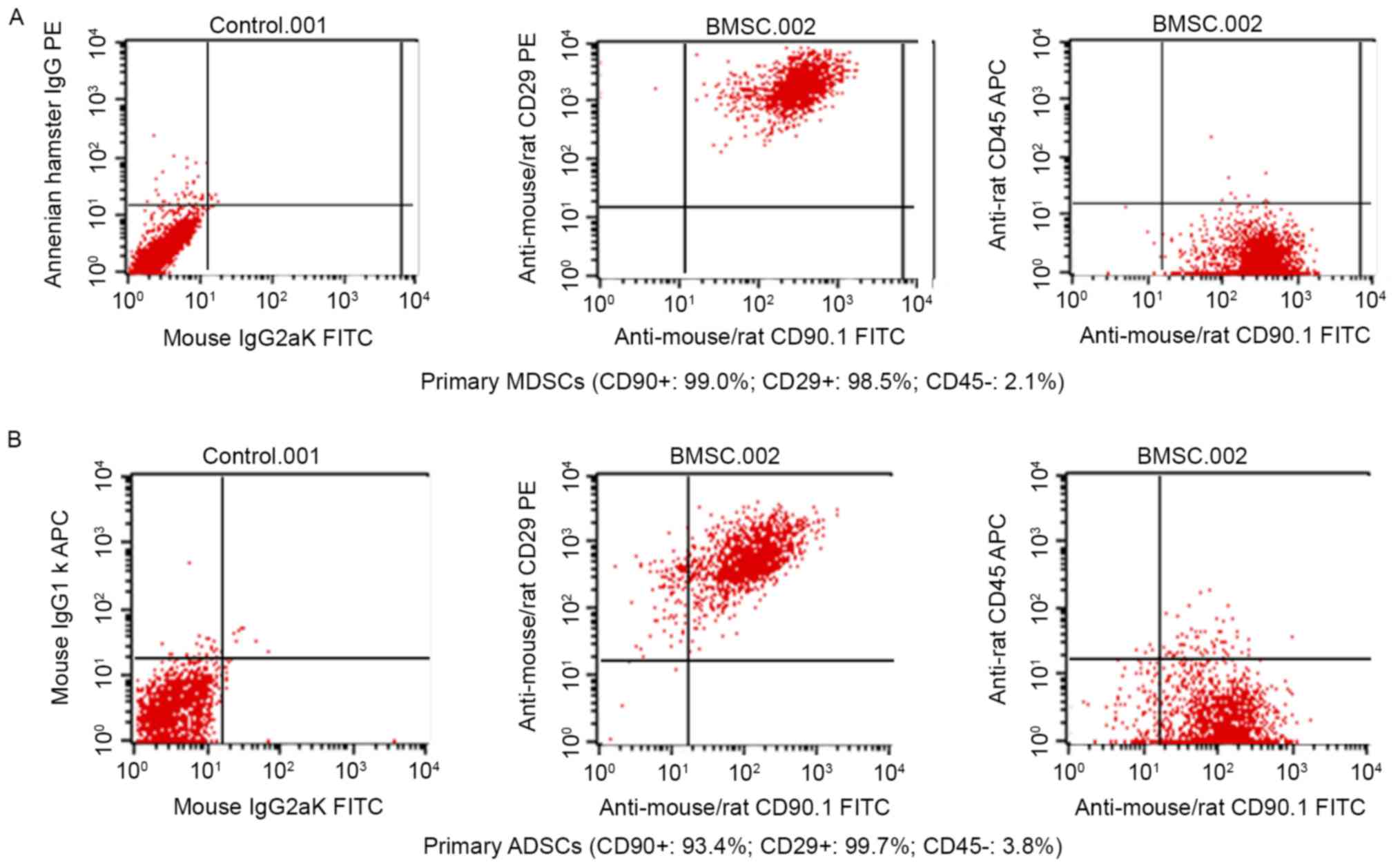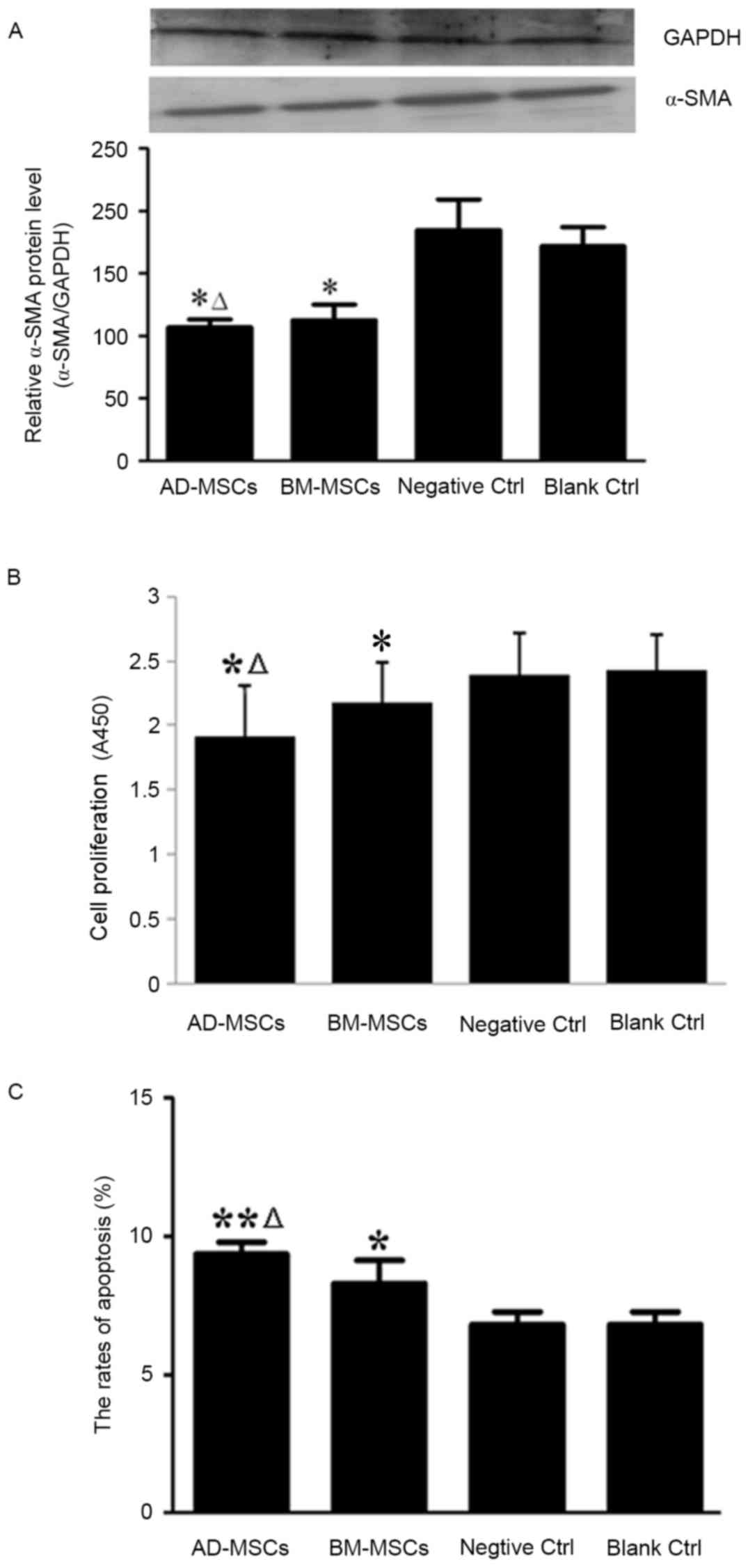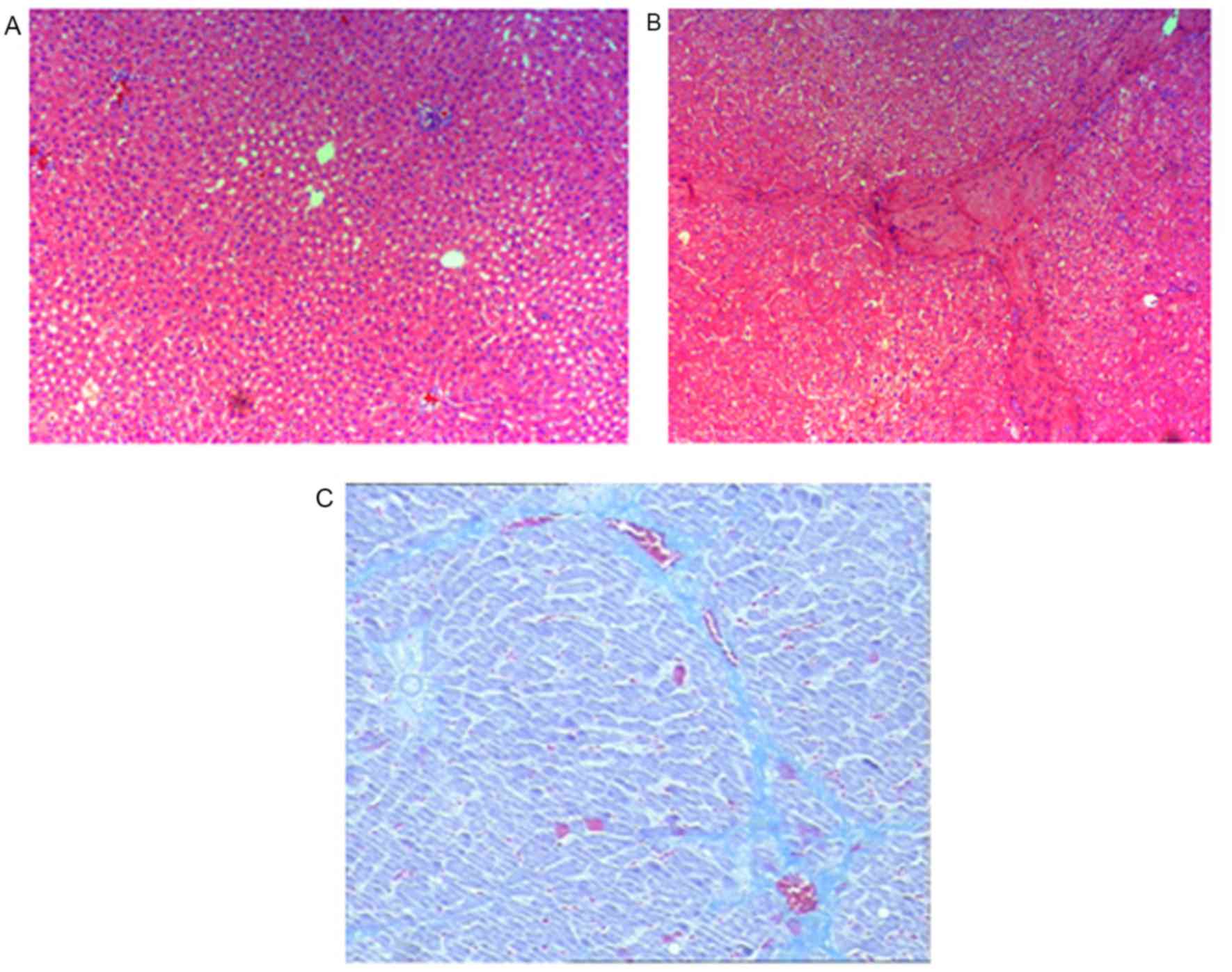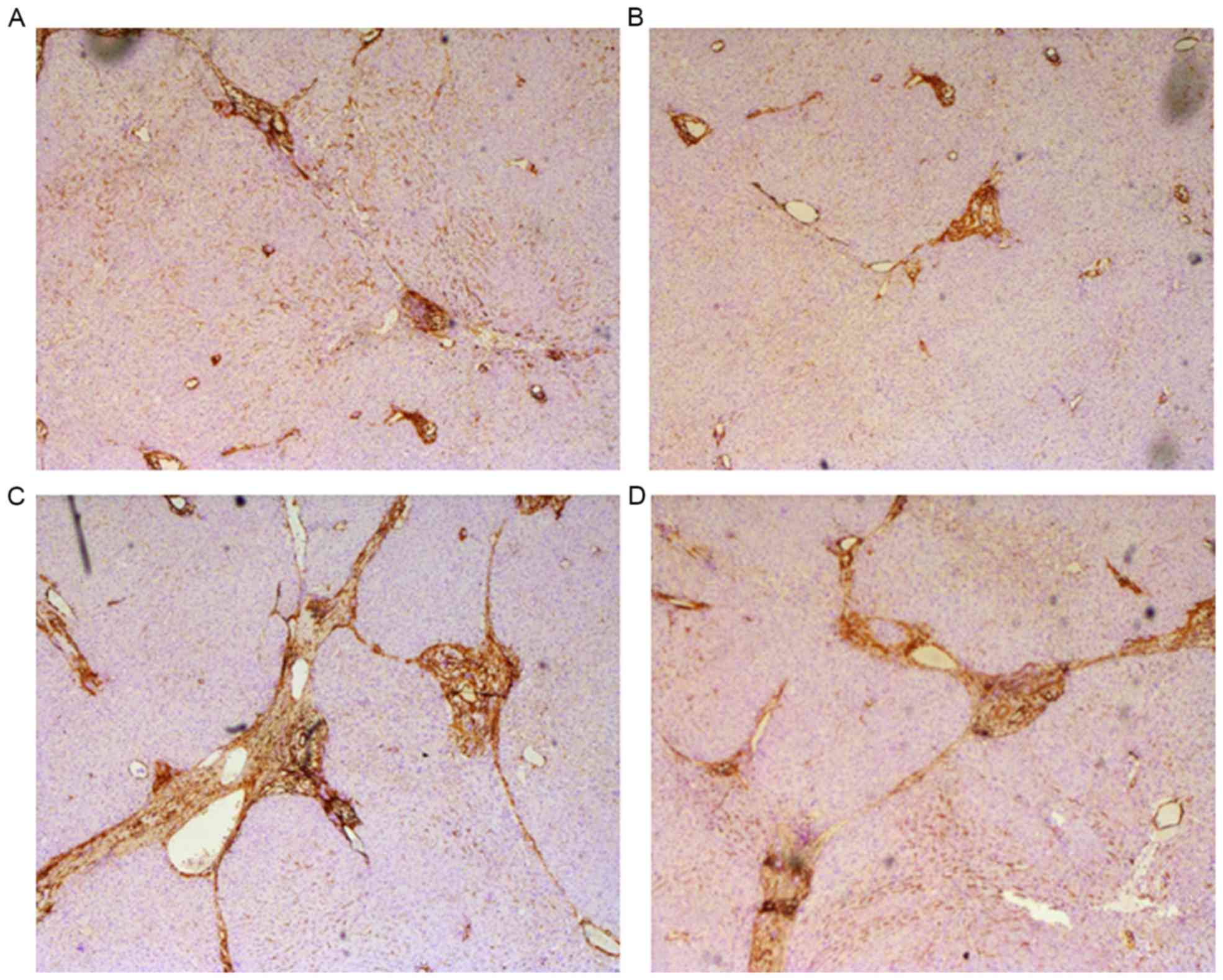|
1
|
Friedman SL: Liver fibrosis-from bench to
bedside. J Hepatol. 38 Suppl 1:S38–S53. 2003. View Article : Google Scholar : PubMed/NCBI
|
|
2
|
Bosch J and García-Pagán JC: Complications
of cirrhosis. I. Portal hypertension. J Hepatol. 32 1
Suppl:S141–S156. 2000. View Article : Google Scholar
|
|
3
|
Cárdenas A: Hepatorenal syndrome: A
dreaded complication of end-stage liver disease. Am J
Gastroenterol. 100:460–467. 2005. View Article : Google Scholar : PubMed/NCBI
|
|
4
|
Bataller R and Brenner DA: Liver fibrosis.
J Clin Invest. 115:209–218. 2005. View Article : Google Scholar : PubMed/NCBI
|
|
5
|
Friedman SL: Hepatic stellate cells:
Protean, multifunctional, and enigmatic cells of the liver. Physiol
Rev. 88:125–172. 2008. View Article : Google Scholar : PubMed/NCBI
|
|
6
|
Salem HK and Thiemermann C: Mesenchymal
stromal cells: Current understanding and clinical status. Stem
Cells. 28:585–596. 2010.PubMed/NCBI
|
|
7
|
Dezawa M, Ishikawa H, Itokazu Y, Yoshihara
T, Hoshino M, Takeda S, Ide C and Nabeshima Y: Bone marrow stromal
cells generate muscle cells and repair muscle degeneration.
Science. 309:314–317. 2005. View Article : Google Scholar : PubMed/NCBI
|
|
8
|
Das M, Sundell IB and Koka PS: Adult
mesenchymal stem cells and their potency in the cell-based therapy.
J Stem Cells. 8:1–16. 2013.PubMed/NCBI
|
|
9
|
Lu T, Yang C, Sun H, Lv J, Zhang F and
Dong XJ: FGF4 and HGF promote differentiation of mouse bone marrow
mesenchymal stem cells into hepatocytes via the MAPK pathway. Genet
Mol Res. 13:415–424. 2014. View Article : Google Scholar : PubMed/NCBI
|
|
10
|
Ren G, Chen X, Dong F, Li W, Ren X, Zhang
Y and Shi Y: Concise review: Mesenchymal stem cells and
translational medicine: Emerging issues. Stem Cells Transl Med.
1:51–58. 2012. View Article : Google Scholar : PubMed/NCBI
|
|
11
|
Sakaida I, Terai S, Yamamoto N, Aoyama K,
Ishikawa T, Nishina H and Okita K: Transplantation of bone marrow
cells reduces CCl4-induced liver fibrosis in mice. Hepatology.
40:1304–1311. 2004. View Article : Google Scholar : PubMed/NCBI
|
|
12
|
Chamberlain G, Fox J, Ashton B and
Middleton J: Concise review: Mesenchymal stem cells: Their
phenotype, differentiation capacity, immunological features, and
potential for homing. Stem Cells. 25:2739–2749. 2007. View Article : Google Scholar : PubMed/NCBI
|
|
13
|
Qi Z, Zhang Y, Liu L, Guo X, Qin J and Cui
G: Mesenchymal stem cells derived from different origins have
unique sensitivities to different chemotherapeutic agents. Cell
Biol Int. 36:857–862. 2012. View Article : Google Scholar : PubMed/NCBI
|
|
14
|
Berardis S, Lombard C, Evraerts J, El
Taghdouini A, Rosseels V, Sancho-Bru P, Lozano JJ, van Grunsven L,
Sokal E and Najimi M: Gene expression profiling and secretome
analysis differentiate adult-derived human liver stem/progenitor
cells and human hepatic stellate cells. PLoS One. 9:e861372014.
View Article : Google Scholar : PubMed/NCBI
|
|
15
|
Takeda M, Yamamoto M, Isoda K, Higashiyama
S, Hirose M, Ohgushi H, Kawase M and Yagi K: Availability of bone
marrow stromal cells in three-dimensional coculture with
hepatocytes and transplantation into liver-damaged mice. J Biosci
Bioeng. 100:77–81. 2005. View Article : Google Scholar : PubMed/NCBI
|
|
16
|
Yu F, Ji S, Su L, Wan L, Zhang S, Dai C,
Wang Y, Fu J and Zhang Q: Adipose-derived mesenchymal stem cells
inhibit activation of hepatic stellate cells in vitro and
ameliorate rat liver fibrosis in vivo. J Formos Med Assoc.
114:130–138. 2015. View Article : Google Scholar : PubMed/NCBI
|
|
17
|
Liu Y, Wang Z, Wang J, Lam W, Kwong S, Li
F, Friedman SL, Zhou S, Ren Q, Xu Z, et al: A histone deacetylase
inhibitor, largazole, decreases liver fibrosis and angiogenesis by
inhibiting transforming growth factor-β and vascular endothelial
growth factor signalling. Liver Int. 33:504–515. 2013. View Article : Google Scholar : PubMed/NCBI
|
|
18
|
Majumder S, Piguet AC, Dufour JF and
Chatterjee S: Study of the cellular mechanism of Sunitinib mediated
inactivation of activated hepatic stellate cells and its
implications in angiogenesis. Eur J Pharmacol. 705:86–95. 2013.
View Article : Google Scholar : PubMed/NCBI
|
|
19
|
Chen YX, Huang YH, Zheng WD, Chen ZX,
Zhang LJ and Wang XZ: Interleukin-10 gene modification attenuates
hepatocyte activation of rat hepatic stellate cells in
vitro. Mol Med Rep. 7:371–378. 2013. View Article : Google Scholar : PubMed/NCBI
|
|
20
|
Yu F, Su L, Ji S, Zhang S, Yu P, Zheng Y
and Zhang Q: Inhibition of hepatic stellate cell activation and
liver fibrosis by fat-specific protein 27. Mol Cell Biochem.
369:35–43. 2012. View Article : Google Scholar : PubMed/NCBI
|
|
21
|
Sumida Y, Nakajima A and Itoh Y:
Limitations of liver biopsy and non-invasive diagnostic tests for
the diagnosis of nonalcoholic fatty liver disease/nonalcoholic
steatohepatitis. World J Gastroenterol. 20:475–485. 2014.
View Article : Google Scholar : PubMed/NCBI
|
|
22
|
Yu J, Zhang S, Chu ES, Go MY, Lau RH, Zhao
J, Wu CW, Tong L, Zhao J, vPoon TC and Sung JJ: Peroxisome
proliferator-activated receptors gamma reverses hepatic nutritional
fibrosis in mice and suppresses activation of hepatic stellate
cells in vitro. Int J Biochem Cell Biol. 42:948–957. 2010.
View Article : Google Scholar : PubMed/NCBI
|
|
23
|
Liu Y, Wang Z, Wang J, Lam W, Kwong S, Li
F, Friedman SL, Zhou S, Ren Q, Xu Z, et al: A histone deacetylase
inhibitor, largazole, decreases liver fibrosis and angiogenesis by
inhibiting transforming growth factor-β and vascular endothelial
growth factor signaling. Liver Int. 33:504–515. 2013. View Article : Google Scholar : PubMed/NCBI
|
|
24
|
Huang X, Wang X, Lv Y, Xu L, Lin J and
Diao Y: Protection effect of kallistatin on carbon
tetrachloride-induced liver fibrosis in rats via antioxidative
stress. PLoS One. 9:e884982014. View Article : Google Scholar : PubMed/NCBI
|
|
25
|
Sato Y, Araki H, Kato J, Nakamura K,
Kawano Y, Kobune M, Sato T, Miyanishi K, Takayama T, Takahashi M,
et al: Human mesenchymal stem cells xenografted directly to rat
liver are differentiated into human hepatocytes without fusion.
Blood. 106:756–763. 2005. View Article : Google Scholar : PubMed/NCBI
|
|
26
|
Sharma RR, Pollock K, Hubel A and McKenna
D: Mesenchymal stem or stromal cells: A review of clinical
applications and manufacturing practices. Transfusion.
54:1418–1437. 2014. View Article : Google Scholar : PubMed/NCBI
|
|
27
|
Wang J, Bian C, Liao L, Zhu Y, Li J, Zeng
L and Zhao RC: Inhibition of hepatic stellate cells proliferation
by mesenchymal stem cells and the possible mechanisms. Hepatol Res.
39:1219–1228. 2009. View Article : Google Scholar : PubMed/NCBI
|
|
28
|
Haddad R and Saldanha-Araujo F: Mechanisms
of T-cell immunosuppression by mesenchymal stromal cells: What do
we know so far? Biomed Res Int. 2014:2168062014. View Article : Google Scholar : PubMed/NCBI
|
|
29
|
Sakaida I, Terai S, Yamamoto N, Aoyama K,
Ishikawa T, Nishina H and Okita K: Transplantation of bone marrow
cells reduces CCl4-induced liver fibrosis in mice. Hepatology.
40:1304–1311. 2004. View Article : Google Scholar : PubMed/NCBI
|
|
30
|
Ma ZG, Lv XD, Zhan LL, Chen L, Zou QY,
Xiang JQ, Qin JL, Zhang WW, Zeng ZJ, Jin H, et al: Human
urokinase-type plasminogen activator gene-modified bone
marrow-derived mesenchymalstem cells attenuate liver fibrosis in
rats by down-regulating the Wnt signaling pathway. World J
Gastroenterol. 22:2092–2103. 2016. View Article : Google Scholar : PubMed/NCBI
|
|
31
|
Iyer SS and Cheng G: Role of interleukin
10 transcriptional regulation in inflammation and autoimmune
disease. Crit Rev Immunol. 32:23–63. 2012. View Article : Google Scholar : PubMed/NCBI
|
|
32
|
Liedtke C, Luedde T, Sauerbruch T,
Scholten D, Streetz K, Tacke F, Tolba R, Trautwein C, Trebicka J
and Weiskirchen R: Experimental liver fibrosis research: Update on
animal models, legal issues and translational aspects. Fibrogenesis
Tissue Repair. 6:192013. View Article : Google Scholar : PubMed/NCBI
|















